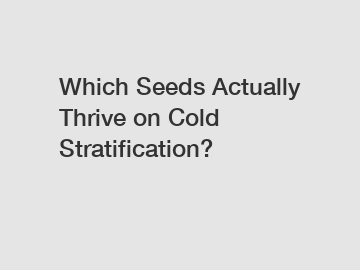Which Seeds Actually Thrive on Cold Stratification?
Cold stratification is a process used to simulate the winter conditions that certain seeds need in order to germinate. This process typically involves exposing seeds to moist, cold conditions for a certain period of time. Not all seeds require cold stratification, but for those that do, it is essential for their successful growth. In this article, we will explore which seeds actually thrive on cold stratification.
**Seeds That Benefit from Cold Stratification**.
Some seeds have a natural dormancy mechanism that prevents them from germinating unless they experience a period of cold stratification. This process mimics the conditions that would naturally occur in the wild during the winter months. Seeds that benefit from cold stratification include those from trees, shrubs, and perennial flowers.

Trees such as oaks, maples, and birches often require cold stratification for successful germination. The cold temperatures help to break down the seed coat, allowing water and oxygen to penetrate the seed and initiate the germination process. Without this period of cold dormancy, these seeds may remain dormant and never sprout.
Shrubs like dogwoods, viburnums, and serviceberries also benefit from cold stratification. These plants often grow in regions with cold winters, so the process of cold stratification helps them synchronize their growth with the changing seasons. By subjecting their seeds to cold temperatures, gardeners can improve the chances of successful germination and healthy plant growth.
Perennial flowers such as milkweed, columbine, and echinacea may also require cold stratification. These plants produce seeds that need to experience a period of cold dormancy before they will sprout. Cold stratification helps to ensure that the seeds germinate at the optimal time, giving them the best chance of survival and successful growth.
**Seeds That Do Not Require Cold Stratification**.
While many seeds benefit from cold stratification, there are also seeds that do not require this process in order to germinate. Seeds from annual flowers, vegetables, and some herbs do not typically need cold treatment to sprout. These seeds are often able to germinate under a wider range of conditions, making them easier to grow for novice gardeners.
Annual flowers like marigolds, zinnias, and cosmos are examples of seeds that do not need cold stratification. These plants are typically grown as annuals and have adapted to germinate quickly and easily without the need for cold treatment. Similarly, many common vegetable seeds, such as tomatoes, peppers, and squash, do not require cold stratification to sprout and grow.
**Conclusion**.
In conclusion, cold stratification is a crucial process for certain seeds that require a period of cold dormancy in order to germinate successfully. Trees, shrubs, and perennial flowers are examples of plants that often benefit from cold treatment. By subjecting these seeds to cold temperatures, gardeners can improve their chances of successful germination and healthy plant growth. On the other hand, seeds from annual flowers, vegetables, and herbs typically do not require cold stratification. Understanding which seeds thrive on cold stratification can help gardeners plan and optimize their planting strategies for a successful growing season.
If you have any questions about cold stratification or need help selecting seeds for your garden, feel free to contact us for expert advice and assistance. Happy gardening!
Are you interested in learning more about chinese pumpkin seeds wholesale, Grain Seed Suppliers, fast ball cabbage? Contact us today to secure an expert consultation!


